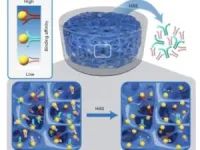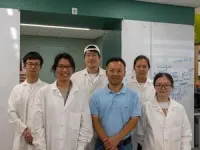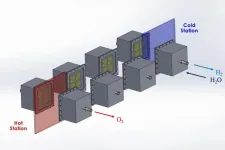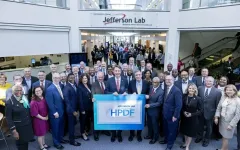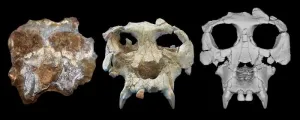(Press-News.org) Andrea Califano, Dr, has been honored with the 26th Alfred G. Knudson Award in Cancer Genetics by the National Cancer Institute (NCI) for his exceptional contributions to the field of cancer research. Califano, a pioneer in the field of cancer genetics, is the Clyde and Helen Wu Professor of Chemical and Systems Biology at Columbia University Vagelos College of Physicians and Surgeons and a member of the Herbert Irving Comprehensive Cancer Center.
The award is named in honor of geneticist and cancer researcher Alfred G. Knudson, MD, a 1947 graduate of the Vagelos College of Physicians and Surgeons, who helped uncover several major genetic mysteries behind cancer leading to his “two-hit” hypothesis explaining the relationship between hereditary and non-hereditary cancer. The NCI presents this prestigious award to individuals who have advanced our understanding about the genetic workings of the disease. Califano joins the ranks of esteemed past recipients, including Columbia researcher Riccardo Dalla-Favera, MD, as well as Nobel laureates J. Michael Bishop, MD, Robert Horvitz, PhD, Harold Varmus, MD (a 1966 VP&S graduate), Leland Hartwell, PhD, and Elizabeth H. Blackburn, PhD. Califano received his award today at the 2023 NCI Intramural Scientific Retreat, where he presented an award lecture.
“Dr. Califano’s innovative work has led the field and yielded new insights into cancer biology, particularly in the elucidation of how regulation of specific pathways can drive cancer,” says Stephen Chanock, MD, director of the NCI’s division of cancer epidemiology and genetics, who presented the award. “His work on how these changes can influence tumor dependency represents an important foundation for developing novel approaches to therapy, particularly in relapsed cancer.”
Approaching cancer research with a background in physics, Califano's passion has been to create an “assembly manual” of the cancer cell, using computational and experimental approaches to create a comprehensive, tumor-specific map of the complex network of molecular interactions that determine a malignant cell’s behavior and response to treatment. His lab works to uncover the master regulators—key load-bearing pillars in that regulatory network that work together to power the cancer cell—that can be targeted with therapies to create more precise and effective treatments. This approach has resulted in several clinical trials, including a novel, RNA-based N-of-1 precision oncology study.
“I am deeply honored and humbled to receive this award from the NCI,” Califano says. “I continue to be inspired and motivated by the ability of my colleagues to look at cancer from novel and complementary angles. I am convinced that collaboration between cancer researchers with different backgrounds is absolutely critical to advancing our understanding of cancer’s weaknesses and, ultimately, to finding new therapies that improve the lives of cancer patients and their families.”
Califano is the founding chair of the Department of Systems Biology and was director of the JP Sulzberger Columbia Genome Center from 2013 to 2023. While retaining his Columbia appointments, he is about to take leadership of a new multi-institutional research center in the New York area that will be announced later this week. He has received several awards and recognitions, including the 2015 and 2022 NCI Outstanding Investigator Award and the 2019 Ruth Leff Siegel Award in Pancreatic Cancer. He is a member of the National Academy of Medicine, as well as a fellow of the American Association for the Advancement of Science, International Society for Computational Biology, and IEEE (Institute of Electrical and Electronics Engineers).
END
Andrea Califano receives Alfred G. Knudson award from NCI
The award recognizes individuals who have advanced our understanding of cancer genetics
2023-10-16
ELSE PRESS RELEASES FROM THIS DATE:
Learning more about how cancer affects stroke risk
2023-10-16
Patients with a previous or current cancer diagnosis are more likely to have a stroke than the general population, but how are specific cancers and treatments associated with stroke risk?
A collaborative team led by University of Cincinnati, University of North Carolina (UNC) and Duke University researchers is seeking to answer that question.
Soma Sengupta, MD, PhD, now division chief of neuro-oncology at UNC, had the idea to study the prevalence of stroke in patients with different cancer types while a faculty member at UC. She recruited a team that included stroke experts Stacie Demel, DO, PhD, of UC and Wuwei Feng of Duke to put together a retrospective pilot study.
“This ...
MIT design would harness 40% of the sun’s heat to produce clean hydrogen fuel
2023-10-16
MIT engineers aim to produce totally green, carbon-free hydrogen fuel with a new, train-like system of reactors that is driven solely by the sun.
In a study appearing today in Solar Energy Journal, the engineers lay out the conceptual design for a system that can efficiently produce “solar thermochemical hydrogen.” The system harnesses the sun’s heat to directly split water and generate hydrogen — a clean fuel that can power long-distance trucks, ships, and planes, while in the process emitting no greenhouse gas emissions.
Today, hydrogen is largely produced through processes that involve natural gas and other fossil fuels, ...
Fungal infection in the brain produces changes like those seen in Alzheimer’s disease
2023-10-16
Previous research has implicated fungi in chronic neurodegenerative conditions such as Alzheimer’s disease, but there is limited understanding of how these common microbes could be involved in the development of these conditions.
Working with animal models, researchers at Baylor College of Medicine and collaborating institutions discovered how the fungus Candida albicans enters the brain, activates two separate mechanisms in brain cells that promote its clearance, and, important for the understanding of Alzheimer’s disease development, generates amyloid beta (Ab)-like peptides, toxic protein ...
Jefferson Lab to lead $300+ million high performance data facility hub
2023-10-16
NEWPORT NEWS, VA – The U.S. Department of Energy has just announced the selection of Thomas Jefferson National Accelerator Facility as the lead for its new High Performance Data Facility Hub. Jefferson Lab will partner with DOE’s Lawrence Berkeley National Laboratory to form a joint project team led by Jefferson Lab. The HPDF will be a $300-500 million computing and data infrastructure resource that will provide transformational capabilities for data analysis, networking and storage for the nation’s research enterprise. ...
VA study provides new insights into COVID-19 pandemic death rates
2023-10-16
A multi-institutional team of researchers led by the White River Junction VA, and including the West Haven and Palo Alto VA, analyzed electronic health record data from more than 5.9 million Veterans―spanning both pre-pandemic (March 2018 - February 2020) and pandemic (March 2020 - February 2022) periods―to discover nuanced insights from COVID-19’s impact on mortality rates.
While former studies have primarily relied on aggregate data, this research―published in the October 2023 issue of the International Journal of Epidemiology―offered a unique perspective ...
Leading scientists, philosophers identify nature’s missing evolutionary law
2023-10-16
A paper in the prestigious Proceedings of the National Academy of Sciences today describes “a missing law of nature,” recognizing for the first time an important norm within the natural world’s workings.
In essence, the new law states that complex natural systems evolve to states of greater patterning, diversity, and complexity. In other words, evolution is not limited to life on Earth, it also occurs in other massively complex systems, from planets and stars to atoms, minerals, and more.
Authored by a nine-member team — leading scientists from the Carnegie Institution for ...
Study shows long-term health impacts after exposure to environmental disaster
2023-10-16
Exposure to a large-scale disaster, such as a tsunami, impacts population health over a decade later. A new study by an inter-disciplinary team of researchers in the United States and Indonesia has found that women who lived along the coast of Aceh, Indonesia when it was hit by waves from the 2004 tsunami have lower cortisol levels 14 years later than women who lived in other, nearby coastal communities that were not directly affected.
Cortisol is a stress hormone produced by the adrenal glands. Cortisol levels rise in response to stress as part of the fight or flight response, but consistently elevated ...
Extinct ape gets a facelift, 12 million years later
2023-10-16
A new study led by scientists at the American Museum of Natural History, Brooklyn College, and the Catalan Institute of Paleontology Miquel Crusafont has reconstructed the well-preserved but damaged skull of a great ape species that lived about 12 million years ago. The species, Pierolapithecus catalaunicus, may be crucial to understanding great ape and human evolution. The researchers describe their findings today in the journal Proceedings of the National Academy of Sciences.
Pierolapithecus catalaunicus, a species from northeastern Spain first described in 2004, was one of a diverse group of now-extinct ...
Signatures of the Space Age: Spacecraft metals left in the wake of humanity’s path to the stars
2023-10-16
WEST LAFAYETTE, Ind. – The Space Age is leaving fingerprints on one of the most remote parts of the planet — the stratosphere — which has potential implications for climate, the ozone layer and the continued habitability of Earth.
Using tools hitched to the nose cone of their research planes and sampling more than 11 miles above the planet’s surface, researchers have discovered significant amounts of metals in aerosols in the atmosphere, likely from increasingly frequent launches and returns of spacecraft and satellites. That mass of metal is changing atmospheric chemistry in ways that ...
Stress levels worse in women who have heart attacks with blockages, study finds
2023-10-16
Stress and depression are known to increase risk of heart attack, especially among women. They’ve also been linked to worse recovery. But does stress and depression contribute more to women with heart attacks with open arteries or blocked arteries? That’s what a new study published in the Journal of the American College of Cardiology aimed to find out.
Researchers found stress and depression were indeed common among women at the time of heart attack and for two months after. But they also found that women with heart attacks due to blockages (MI-CAD) in their coronary arteries had higher ...
LAST 30 PRESS RELEASES:
New book captures hidden toll of immigration enforcement on families
New record: Laser cuts bone deeper than before
Heart attack deaths rose between 2011 and 2022 among adults younger than age 55
Will melting glaciers slow climate change? A prevailing theory is on shaky ground
New treatment may dramatically improve survival for those with deadly brain cancer
Here we grow: chondrocytes’ behavior reveals novel targets for bone growth disorders
Leaping puddles create new rules for water physics
Scientists identify key protein that stops malaria parasite growth
Wildfire smoke linked to rise in violent assaults, new 11-year study finds
New technology could use sunlight to break down ‘forever chemicals’
Green hydrogen without forever chemicals and iridium
Billion-DKK grant for research in green transformation of the built environment
For solar power to truly provide affordable energy access, we need to deploy it better
Middle-aged men are most vulnerable to faster aging due to ‘forever chemicals’
Starving cancer: Nutrient deprivation effects on synovial sarcoma
Speaking from the heart: Study identifies key concerns of parenting with an early-onset cardiovascular condition
From the Late Bronze Age to today - Old Irish Goat carries 3,000 years of Irish history
Emerging class of antibiotics to tackle global tuberculosis crisis
Researchers create distortion-resistant energy materials to improve lithium-ion batteries
Scientists create the most detailed molecular map to date of the developing Down syndrome brain
Nutrient uptake gets to the root of roots
Aspirin not a quick fix for preventing bowel cancer
HPV vaccination provides “sustained protection” against cervical cancer
Many post-authorization studies fail to comply with public disclosure rules
GLP-1 drugs combined with healthy lifestyle habits linked with reduced cardiovascular risk among diabetes patients
Solved: New analysis of Apollo Moon samples finally settles debate about lunar magnetic field
University of Birmingham to host national computing center
Play nicely: Children who are not friends connect better through play when given a goal
Surviving the extreme temperatures of the climate crisis calls for a revolution in home and building design
The wild can be ‘death trap’ for rescued animals
[Press-News.org] Andrea Califano receives Alfred G. Knudson award from NCIThe award recognizes individuals who have advanced our understanding of cancer genetics

